112 scholarly books by Bucknell University Press and 5
start with R
112 scholarly books by Bucknell University Press and 5
112 scholarly books by Bucknell University Press
5 start with R start with R
5 start with R start with R
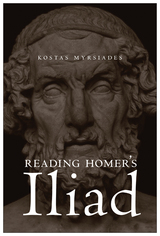
Reading Homer's Iliad
Kostas Myrsiades
Bucknell University Press, 2023
We still read Homer’s epic the Iliad two-and-one-half millennia since its emergence for the questions it poses and the answers it provides for our age, as viable today as they were in Homer’s own times. What is worth dying for? What is the meaning of honor and fame? What are the consequences of intense emotion and violence? What does recognition of one’s mortality teach? We also turn to Homer’s Iliad in the twenty-first century for the poet’s preoccupation with the essence of human life. His emphasis on human understanding of mortality, his celebration of the human mind, and his focus on human striving after consciousness and identity has led audiences to this epic generation after generation. This study is a book-by-book commentary on the epic’s 24 parts, meant to inform students new to the work. Endnotes clarify and elaborate on myths that Homer leaves unfinished, explain terms and phrases, and provide background information. The volume concludes with a general bibliography of work on the Iliad, in addition to bibliographies accompanying each book’s commentary.
[more]
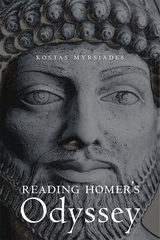
Reading Homer’s Odyssey
Kostas Myrsiades
Bucknell University Press, 2019
Finalist for the 2020 PROSE Awards, Classics section
Homer’s Odyssey is the first great travel narrative in Western culture. A compelling tale about the consequences of war, and about redemption, transformation, and the search for home, the Odyssey continues to be studied in universities and schools, and to be read and referred to by ordinary readers. Reading Homer’s Odyssey offers a book-by-book commentary on the epic’s themes that informs the non-specialist and engages the seasoned reader in new perspectives. Among the themes discussed are hospitality, survival, wealth, reputation and immortality, the Olympian gods, self-reliance and community, civility, behavior, etiquette and technology, ease, inactivity and stagnation, Penelope’s relationship with Odysseus, Telemachus’ journey, Odysseus’ rejection of Calypso’s offer of immortality, Odysseus’ lies, Homer’s use of the House of Atreus and other myths, the cinematic qualities of the epic’s structure, women’s role in the epic, and the Odyssey’s true ending. Footnotes clarify and elaborate upon myths that Homer leaves unfinished, explain terms and phrases, and provide background information. The volume concludes with a general bibliography of work on the Odyssey, in addition to the bibliographies that accompany each book’s commentary.
Published by Bucknell University Press. Distributed worldwide by Rutgers University Press.
Homer’s Odyssey is the first great travel narrative in Western culture. A compelling tale about the consequences of war, and about redemption, transformation, and the search for home, the Odyssey continues to be studied in universities and schools, and to be read and referred to by ordinary readers. Reading Homer’s Odyssey offers a book-by-book commentary on the epic’s themes that informs the non-specialist and engages the seasoned reader in new perspectives. Among the themes discussed are hospitality, survival, wealth, reputation and immortality, the Olympian gods, self-reliance and community, civility, behavior, etiquette and technology, ease, inactivity and stagnation, Penelope’s relationship with Odysseus, Telemachus’ journey, Odysseus’ rejection of Calypso’s offer of immortality, Odysseus’ lies, Homer’s use of the House of Atreus and other myths, the cinematic qualities of the epic’s structure, women’s role in the epic, and the Odyssey’s true ending. Footnotes clarify and elaborate upon myths that Homer leaves unfinished, explain terms and phrases, and provide background information. The volume concludes with a general bibliography of work on the Odyssey, in addition to the bibliographies that accompany each book’s commentary.
Published by Bucknell University Press. Distributed worldwide by Rutgers University Press.
[more]
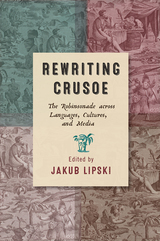
Rewriting Crusoe
The Robinsonade across Languages, Cultures, and Media
Jakub Lipski
Bucknell University Press, 2020
Published in 1719, Defoe’s Robinson Crusoe is one of those extraordinary literary works whose importance lies not only in the text itself but in its persistently lively afterlife. German author Johann Gottfried Schnabel—who in 1731 penned his own island narrative—coined the term “Robinsonade” to characterize the genre bred by this classic, and today hundreds of examples can be identified worldwide. This celebratory collection of tercentenary essays testifies to the Robinsonade’s endurance, analyzing its various literary, aesthetic, philosophical, and cultural implications in historical context. Contributors trace the Robinsonade’s roots from the eighteenth century to generic affinities in later traditions, including juvenile fiction, science fiction, and apocalyptic fiction, and finally to contemporary adaptations in film, television, theater, and popular culture. Taken together, these essays convince us that the genre’s adapt- ability to changing social and cultural circumstances explains its relevance to this day.
Published by Bucknell University Press. Distributed worldwide by Rutgers University Press.
Published by Bucknell University Press. Distributed worldwide by Rutgers University Press.
[more]
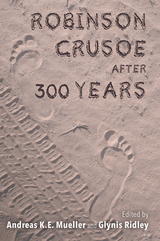
Robinson Crusoe after 300 Years
Andreas K. E. Mueller
Bucknell University Press, 2021
There is no shortage of explanations for the longevity of Defoe’s Robinson Crusoe, which has been interpreted as both religious allegory and frontier myth, with Crusoe seen as an example of the self-sufficient adventurer and the archetypal colonizer and capitalist. Defoe’s original has been reimagined multiple times in legions of Robinsonade or castaway stories, but the Crusoe myth is far from spent. This wideranging collection brings together eleven scholars who suggest new and unfamiliar ways of thinking about this most familiar of works, and who ask us to consider the enduring appeal of “Crusoe,” more recognizable today than ever before.
[more]
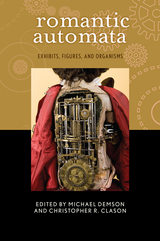
Romantic Automata
Exhibitions, Figures, Organisms
Michael Demson
Bucknell University Press, 2020
For most of the eighteenth century, automata were deemed a celebration of human ingenuity, feats of science and reason. Among the Romantics, however, they prompted a contradictory apprehension about mechanization and contrivance: such science and engineering threatened the spiritual nature of life, the source of compassion in human society. A deep dread of puppets and the machinery that propels them consequently surfaced in late eighteenth and early nineteenth century literature. Romantic Automata is a collection of essays examining the rise of this cultural suspicion of mechanical imitations of life.
Recent scholarship in post-humanism, post-colonialism, disability studies, post-modern feminism, eco-criticism, and radical Orientalism has significantly affected the critical discourse on this topic. In engaging with the work and thought of Coleridge, Poe, Hoffmann, Mary Shelley, and other Romantic luminaries, the contributors to this collection open new methodological approaches to understanding human interaction with technology that strives to simulate, supplement, or supplant organic life.
Published by Bucknell University Press. Distributed worldwide by Rutgers University Press.
Recent scholarship in post-humanism, post-colonialism, disability studies, post-modern feminism, eco-criticism, and radical Orientalism has significantly affected the critical discourse on this topic. In engaging with the work and thought of Coleridge, Poe, Hoffmann, Mary Shelley, and other Romantic luminaries, the contributors to this collection open new methodological approaches to understanding human interaction with technology that strives to simulate, supplement, or supplant organic life.
Published by Bucknell University Press. Distributed worldwide by Rutgers University Press.
[more]
READERS
Browse our collection.
PUBLISHERS
See BiblioVault's publisher services.
STUDENT SERVICES
Files for college accessibility offices.
UChicago Accessibility Resources
home | accessibility | search | about | contact us
BiblioVault ® 2001 - 2024
The University of Chicago Press









